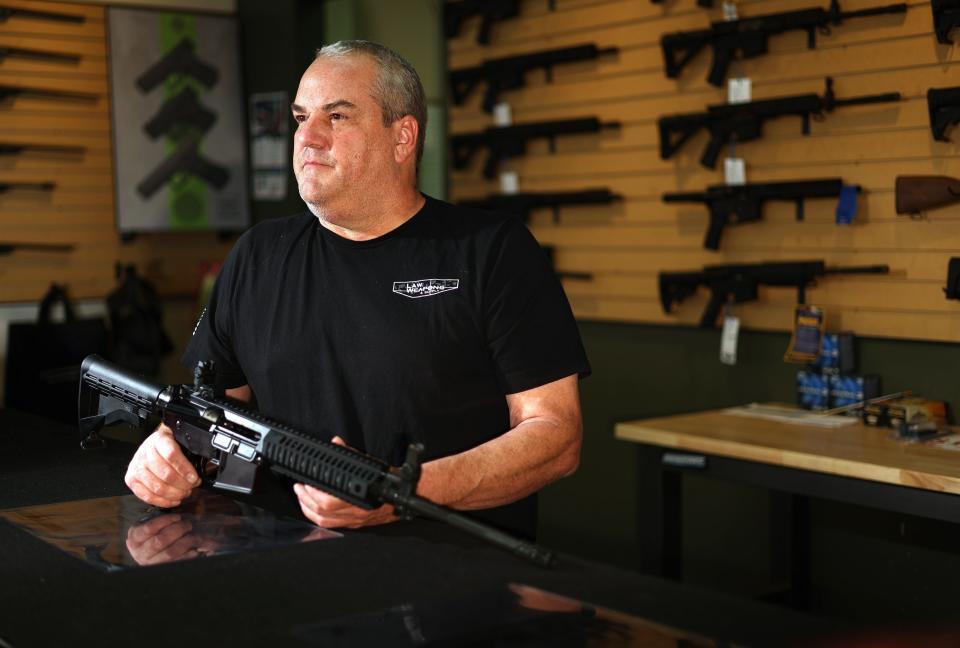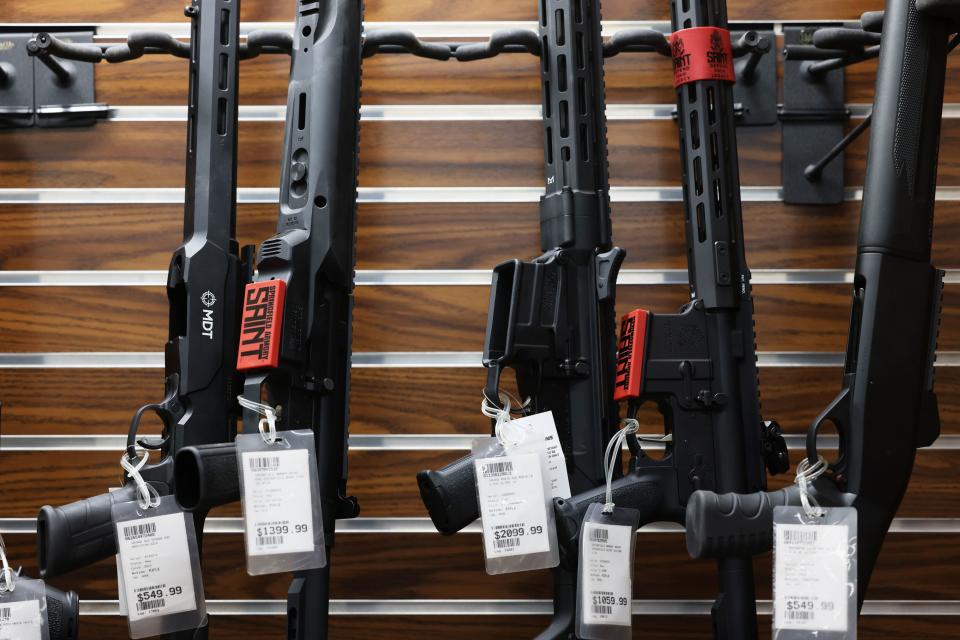Here’s where challenges to Illinois’ gun ban cases stand in state and federal court
Illinois’ sweeping new ban remains in effect despite a barrage of legal challenges.
The state Supreme Court on Friday upheld the law, rejecting a lawsuit filed by plaintiffs led by Republican state Rep. Dan Caulkins of Decatur that argued the ban violated the Illinois constitution.
The law, which was enacted in January in response to the deadly mass shooting at Highland Park’s Fourth of July parade in 2022, bans the delivery, sale, import and purchase of more than 100 types of semi-automatic rifles, pistols and shotguns, along with high capacity ammunition magazines and devices called switches that allow guns to fire more rapidly. People who possessed the newly banned weapons before the law took effect Jan. 10 can keep them but will have to register them with Illinois State Police by the start of next year.
Since the law took effect, there have been at least 11 lawsuits from gun rights groups, gun shop owners, individual gun owners and Republican politicians challenging the gun ban in both state and federal courts. Here’s a look at where those legal challenges stand.
Federal courts
Six separate federal lawsuits were consolidated before the 7th U.S. Circuit Court of Appeals in Chicago, which heard arguments June 29. All of the plaintiffs argue the gun ban violates the right to bear arms under the Second Amendment.
The 7th Circuit has not said when it expects to issue an opinion.
Four of the cases were previously consolidated in U.S. District Court for the Southern District of Illinois. In late April, U.S. District Judge Stephen McGlynn, who was appointed to the bench by President Donald Trump in 2020, issued an injunction, blocking the law.
But six days later, on May 4, the 7th Circuit overruled the lower court, putting the ban back in effect. The Illinois State Police has said the possession of any banned weapon purchased during the six-day window when the injunction was in place will be illegal beginning Jan. 1.
Also part of the consolidated case is a lawsuit a Naperville gun store owner, Robert Bevis, filed against the west suburb over a local ban the city approved in August 2022. The state was added as a defendant in the lawsuit after the statewide ban was enacted in January. After both the U.S. District Court for the Northern District of Illinois and the 7th Circuit denied Bevis’s request for an injunction, he asked the U.S. Supreme Court to step in. The high court declined.
The sixth case before the federal appeals court is a challenge brought against the state, the city of Chicago and Cook County by Chicago emergency room physician Javier Herrera, who argues state and local bans violate his Second Amendment rights. He appealed to the 7th Circuit after a district court judge in Chicago declined to issue an injunction.
Separately, a lawsuit in state court by Republican McHenry County State’s Attorney Patrick Kenneally was moved to federal court at the state’s request. However, the state subsequently asked a judge to send it back to state court. A ruling is pending.
Kenneally argues the gun ban places him in “an impossible ethical quandary of enforcing new, unconstitutional criminal offenses against citizens who are lawfully exercising their constitutional rights.”
State court
It was not immediately clear what effect Friday’s state Supreme Court ruling will have on other lawsuits challenging the ban in state court.
Caulkins alleged that the gun ban violates the equal protection and special legislation clauses of the Illinois Constitution. That argument focused, in part, on exceptions in the law for police officers and others, as well as a grandfather clause for people who owned the weapons prior to the ban.
A Macon County judge ruled in Caulkins’ favor in early March, blocking enforcement of the law for the lawmaker and other named plaintiffs. The state appealed immediately to the state’s highest court.
The state Supreme Court, which has a Democratic majority, rejected those arguments in a 4-3 ruling, finding that the law’s exemptions are valid and within the power of the legislature.
The effect of the ruling on appeals in three other consolidated cases challenging the law on similar grounds that were on hold pending a ruling in the Caulkins case was not immediately clear.
The three cases all were filed by unsuccessful GOP attorney general candidate Thomas DeVore on behalf of more than 150 licensed gun dealers and other entities and thousands of individual gun owners. Plaintiffs include failed Republican governor candidate Darren Bailey, who is now running for the congressional seat held by U.S. Rep. Mike Bost.
Judges issued temporary restraining orders in those cases, blocking enforcement of the law against the named plaintiffs. The ruling in the lead case was previously upheld by the 5th District Appellate Court.
DeVore on Friday said the temporary restraining order on the gun ban that was put in place in Effingham County still applies to thousands of plaintiffs until the courts decide otherwise.
Raoul’s office declined to comment on how Friday’s ruling affects Devore’s cases in Effingham County.


